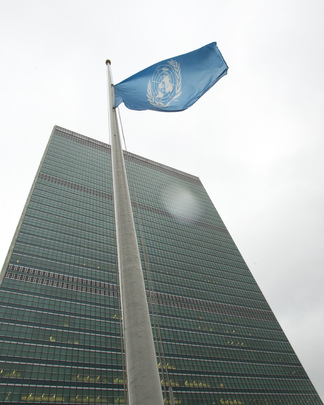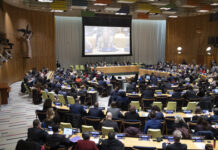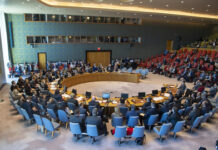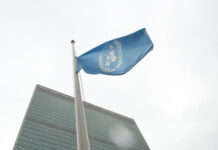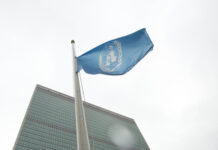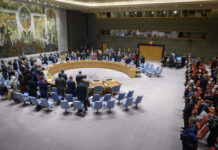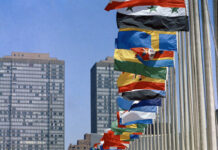But, what exactly are the rules of war, and what happens when they are broken?
To find out more about international humanitarian law, known by its acronym IHL, UN News spoke with Eric Mongelard at the UN human rights office, OHCHR.
Here’s what you need to know:
Rules of war
The fact that war has rules is as old as war. From passages in the Bible and Quran to medieval European codes of chivalry, this ever-growing set of norms aims to limit a conflict’s effects on civilians or other non-combatants.
The laws represent “the very minimum rules to preserve humanity in some of the worst situations known to mankind,” Mr. Mongelard said, noting that the rules of war apply the moment an armed conflict has begun.
The laws in place today are primarily based on the Geneva Conventions, the first of which predates the UN by almost a century.
A UN interpreter works during a debate on international humanitarian law.
What are the Geneva Conventions?
In 1859, Henri Dunant, a Swiss national tended battlefield casualties in Solferino, an experience that prompted him to propose what became the International Committee for Aid to the Wounded.
That group shortly thereafter transformed into the International Committee of the Red Cross (ICRC) followed by the First Geneva Convention, signed in 1864 by 16 European nations. Since then, a growing number of countries have adopted subsequent other Geneva Conventions.
More than 190 States have become parties to the 1949 conventions, which makes them universally applicable.
New rules of war and protocols to the Geneva Conventions have developed as battlefield weaponry and warfare have become more sophisticated and sinister.
International treaties have also emerged to ban a range of weapons triggered by 20th century conflicts, from the use of mustard gas in First World War trenches to airdropping napalm across Viet Nam. These binding conventions are also part of international humanitarian law.
A young British Red Cross worker assists drought victims at a camp in Bati, Ethiopia in 1984.
Who is protected?
Hospitals, schools, civilians, aid workers and safe routes to deliver emergency assistance are among people and places protected by international humanitarian law.
A protocol to the Geneva Conventions adopted in 1977 contains the “most rules” on what must be done to protect civilians from the fighting, Mr. Mongelard said. In general, key principles are divided into two sets of rules, with the first centred on respect for the dignity and life of a person and humane treatment. That includes prohibitions on summary executions and torture.
The second relates to rules that warring parties must comply with when conduction military operations including the principles of distinction, proportionality, and precaution, he said, binding every warring party.
They cannot target civilians, must ensure operations and the weapons they choose to use would minimize or avoid civilian casualties, and must provide sufficient warning to civilian populations of an impending attack.
“Evaluating the effectiveness of a body of law is always a difficult exercise,” he said. “Evidence shows that IHL is more often respected than not.”
Even with these laws in place, 116 aid workers died while doing their jobs in some of the world’s most dangerous places in 2022.
Since the start of the year, 62 aid workers have already been killed, 84 wounded, and 34 kidnapped, according to the UN, which cited provisional data in August from the independent research organization Humanitarian Outcomes. Since 7 October, a total of 15 UN workers have been killed in Gaza.
However, without international humanitarian law and related rules, the situation on battlefields across the world “would be far worse”, Mr. Mongelard said.
“Parties to the conflict, when they’re faced with allegations of, for example, strikes against civilians or civilian infrastructure, will always either seek to deny or seek to explain thereby really reinforcing that they do recognize that these rules are important,” he said.
A boy stands inside the remains of his school in Novohryhorivka, Ukraine.
Ending impunity
“Serious violations of international humanitarian law are war crimes,” he continued. As such, all States have an obligation to criminalize those behaviours, investigate and prosecute perpetrators.
War crimes can only occur in relation to an armed conflict. Meanwhile, crimes against humanity can be committed during war and in peacetime. While there is currently no dedicated treaty on crimes against humanity, the General Assembly initiated in 2022 a two-year process to debate the possibility of elaborating a dedicated convention. The Rome Statute currently provides the latest consensus of the international community on what falls within the scope. It is also the treaty that offers the most extensive list of specific acts that may constitute the crime.
When violations occur, mechanisms have been set up, from UN tribunals for Rwanda and the former Yugoslavia to hybrid courts such as the Cambodia Extraordinary Chambers and national efforts, as was seen in 2020 in the DR Congo when a military court brought a war criminal to justice.
The Hague-based International Criminal Court (ICC), established in 2002 by the Rome Statute, has also had jurisdiction over allegations of serious violations of international humanitarian law.
The first Session of International Tribunal on War Crimes in Former Yugoslavia Opens in the Hague in 1993.
Global courtroom
The first permanent global criminal court established to help end impunity for perpetrators of the most serious crimes of concern to the global international community, the ICC is an independent international organization and is not part of the UN system.
But, the UN has a direct link. The ICC Prosecutor can open cases or investigations referred by the UN Security Council in addition to referral by States parties to the Rome Statute or based on information from reliable sources.
While not all 193 UN Member States are parties to the ICC, the Court can launch investigations and open cases related to alleged crimes committed on the territory or by a national of a State party to the ICC or of a State that has accepted the Court’s jurisdiction. Cases have been heard and decisions rendered on a range of violations, from using rape as a weapon of war to conscripting children as combatants.
The Court is currently investigating 17 cases. Part of its work includes issuing arrest warrants for suspected perpetrators. This includes its outstanding warrant against Russian President Vladimir Putin related to his country’s full-scale invasion of Ukraine.
A five-year-old boy holds up his cat amidst the wreckage of his home in Gaza.
Everyone can contribute
While international humanitarian law governs warring parties to a conflict, the general public has an important role to play, Mr. Mongelard said.
He warned that dehumanizing a group of people can send a message to armed forces that “some violations would be okay”.
“One thing that is important is avoiding the dehumanization of the other or the dehumanization of the enemy, avoiding hate speech and avoiding incitement to violence,” he said. “That’s where the general public can contribute.”
Individuals can also contribute to the work of international organizations. The Office of the Prosecutor of the ICC operates a link that allows anyone to provide submissions of allegations of war crimes, crimes against humanity, genocide and aggression. Similarly, individuals can submit individual complaints related to human rights concerns, including those linked to armed conflicts, to human rights treaty bodies.
A reminder of the warring parties’ obligations regarding the Israel-Gaza crisis was issued by the UN emergency relief coordinator Martin Griffiths who told the UN Security Council.
“There are simple rules of war,” he said. “Parties to armed conflict must protect civilians.”
In the same vein, the World Health Organization (WHO) Regional Director for the Eastern Mediterranean Ahmed Al Mandhari spoke with UN News following a strike on a Gazan hospital.
“Health care is not a target, and it should not be a target,” he said. “WHO is calling all conflicting parties to adhere to international humanitarian law” and “protect civilians” alongside “those health care professionals who are in the field and the ambulances”.
Source of original article: United Nations (news.un.org). Photo credit: UN. The content of this article does not necessarily reflect the views or opinion of Global Diaspora News (www.globaldiasporanews.net).
To submit your press release: (https://www.globaldiasporanews.com/pr).
To advertise on Global Diaspora News: (www.globaldiasporanews.com/ads).
Sign up to Global Diaspora News newsletter (https://www.globaldiasporanews.com/newsletter/) to start receiving updates and opportunities directly in your email inbox for free.


